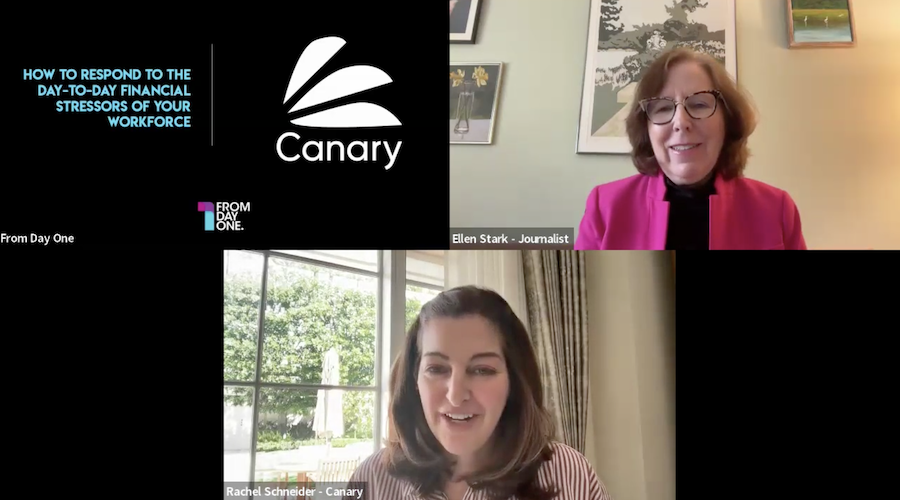How to Respond to the Day-to-Day Financial Stressors of Your Workforce


A unexpected car repair. A large medical bill. A broken furnace. For millions of American workers, these kinds of sudden expenses can be hard to handle—if not impossible. As major expenses like housing, education, and medical care increase, 59% of workers report that their compensation isn’t keeping up with the rising cost of living, according to PwC’s 2023 Employee Financial Wellness Survey; nearly half find it tough to cover household bills every month.
“The cost of living has increased at a greater rate than wages for decades,” said Rachel Schneider, founder of CEO of Canary, a company that enables employers to offer emergency-relief grants. “So there’s a real need for financial solutions that help people to manage that.” In a From Day One Webinar, “How to Respond to the Day-to-Day Financial Stressors of Your Workforce,” Schneider spoke about the financial pressures workers face, how money stress can seep into the workplace, and what employers can do to help.
Prior to founding Canary, Schneider spent years researching the finances of ordinary Americans and co-authored The Financial Diaries: How American Families Cope in a World of Uncertainty. “That really informed the work that I do today at Canary,” she said, “because for so many people, what we saw was this story of volatility.” Many of the families she spoke to made enough to get by—until there was a disruption. And then what?
With little or no emergency savings, workers may resort to high-rate borrowing or retirement-account withdrawals, or simply go without a car or forgo needed medical care. And they don’t leave their troubles at home. “Employers are losing $4.7 billion in productivity every week because of the financial stress that workers are bringing to work,” Schneider said. If the lack of a car means the employee quits, that’s another cost. “We know that, at a minimum, it’s $7,000 to replace a person, even a fairly low-paid person,” Schneider said. “If I could have spent $2,000 to help this person fix their car instead, it’s a huge win for everybody.”
By providing access to health insurance and retirement-savings plans, employers have already taken on an important role in their workers’ financial lives. Recognizing the financial pressures their employees can face, many supplement these benefits with programs to address financial wellness, including education and coaching. And thanks to a recent federal law allowing employers to automatically enroll workers in an emergency savings account tied to their retirement plan, more companies may add that benefit. Schneider encouraged employers to embrace a wide range of solutions: “There’s an incredible need for employers to keep the lens on what is the financial role they play with their workforce as broad as possible.”
One way to do that is by providing employees facing an emergency with cash, something that can happen informally in an office via a GoFundMe campaign or more formally through a pay advance. A few companies have gone so far as to offer formal relief programs, such as Levi’s Red Tab Foundation. “Employers are responsive to this need because it's a basic human desire to help each other,” Schneider said.

It was a recognition of that desire to help that led her to found Canary and make employee emergency grants more widely available. “A lot of people are really living at breakeven, without much cushion to save or to pay back a loan with interest,” Schneider said. “So I was looking for ways that we could efficiently get people additional money in that moment of crisis.” Emergency grant programs can be a major undertaking, involving establishing a nonprofit to disperse grants and a staff to administer them. “How do we make it possible for all employers to do it?”, Schneider recalled thinking.
Canary makes it possible by handling all aspects of the program. Once employers fund a nonprofit relief fund, employees experiencing a financial hardship can apply for small grants online (employers set the maximum size) and submit required documentation. Canary reviews the application and disperses the money, often within days, allowing the worker’s need to remain confidential within the office. The grants—most commonly related to a car or healthcare—are not considered taxable income for the worker.
Of course, a one-time grant may not solve an employee’s financial fragility, so Schneider encourages companies to consider grants as part of a larger financial wellness program, including education and advice. “I think that an emergency fund like ours is really most effective at a company that is thinking holistically about how it can help employees,” she said.
Beyond helping individual workers get past a short-term crisis, this kind of program can have a deeper impact on the workplace, Schneider noted. “People on our platform who’ve received money say things like, my employer has proven that they walk the talk of our core values,” she said. That good will can spread further. Younger workers in particular want to feel a sense of purpose and care about the corporate brands they align themselves with. “The reality is that most of your workforce will not experience a crisis this year that causes them to apply,” Schneider said. “But everyone will know it exists and feel good about it. And that's really powerful.”
Editor’s note: From Day One thanks our partner, Canary, who sponsored this thought leadership spotlight.
Ellen Stark is an executive editor with Foundry 360 at Dotdash Meredith, where she creates relevant and engaging content for major financial services companies. Previously, she spent more than 20 years as a writer and editor at Money magazine and Money.com.
(Featured illustration by Erhui1979/iStock by Getty Images)
The From Day One Newsletter is a monthly roundup of articles, features, and editorials on innovative ways for companies to forge stronger relationships with their employees, customers, and communities.